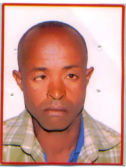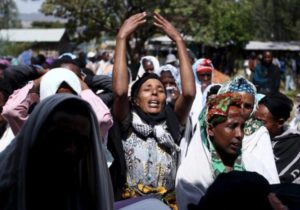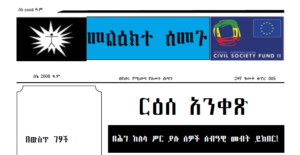በኦሮሚያ ክልል ምዕራብ ሸዋ ዞን ኖኖ አሎ ቀበሌ የተፈፀመ የመብት ጥሰት የመብት ጥሰቱ የኋላ ታሪክ
በኦሮሚያ ብሄራዊ ክልላዊ መንግስት ምዕራብ ሸዋ ዞን ኖኖ ወረዳ በሚገኙ የተለያዩ ቀበሌዎች ውስጥ በእርሻ ሥራ የሚተዳደሩ አርሶ አደሮች የተለያዩ አይነት ሰብሎችን በመዝራት ራሳቸውን፣ ቤተሰባቸውን ክልሉንና በአጠቃላይም ለሀገሪቱ ገበያ የሚቀርብ ምርት በማምረት የሚታወቁ ውጤታማ አርሶ አደሮች ናቸው፡፡ ይሁንና በአካባቢው የሚገኙ ባለስልጣናትና የጸጥታ ሀላፊዎች እነዚህን አርሶ አደሮች “እናንተ የዚህ አካባቢ ተወላጅ ሳትሆኑ ሀብት እያፈራችሁ የአካባቢው ተወላጆች ግን ከናንተ ያነሰ ገቢ ነው ያላቸው… ይህን ገቢ ያገኛችሁት በኛ መሬት ነው፣ ስለዚህ የክልሉ ተወላጆች ባለመሆናችሁ ክልሉን ለቃችሁ ውጡ” በማለት ንብረታቸውን በተለያየ ጊዚ በመንጠቅ እነዚህንም አርሶ አደሮች በተለያዩ ጊዜያት ለህገወጥ እስራት ዳርገዋቸዋል፡፡ የአካባቢውን ተወላጅ ህዝብም “በናንተ መሬት ነው ሀብት ያፈሩት …” እያሉ ጥላቻንና ግጭትን ሲሰእኩ ቆይተዋል፡፡
በተለይም መጋቢት 27 2007 ዓ.ም አቶ ዘመዱ እንዳለ የተባለ የኦሮሞ ብሔረሰብ ተወላጅ ተገድሎ ይገኛል፡፡ እዚህ ላይ ለጊዜው ስሙን የማንገልጸው የግድያ ድርጊቱ ተጠርጣሪ በቁጥጥር ሥር ውሎ ጉዳዩ ውሳኔ ሣያገኝ፣ ይህ “ግድያ የተፈፀመው በአማራ ብሔረሰብ ተወላጆች ነው“ በማለት የኖኖ ወረዳ የፖሊስ አዛዥ የሆኑት ኢንስፔክተር ሀይሉ ድሪባ፣ የናኖ አሎ ቀበሌ ሊቀመንበር አቶ ጎሳዬ ገች እና መቶ አለቃ ገነነ በየነ የተባሉ የፖሊስ አባላት የቀበሌ አመራሮችንና የፖሊስ አባላትን በማስተባበር የአካባቢው ህዝብ በአካባቢው በሚኖሩ የአማራ ብሔረሰብ ተወላጆች ላይ እንዲነሳ በማነሳሳት ሚያዝያ 9 2007 ዓ.ም 85 አርሶ አደር አባወራዎችን ለእስራት ከዳረጉዋቸው በኋላ ቅዳሜ ማለትም ሚያዝያ 10 2007 ዓ.ም ከጠዋቱ 3 ሰዓት አካባቢ ዘር በመምረጥ የአማራ ብሔረሰብ ተወላጆች መኖሪያ ቤትና ንብረት ነው ያሉትን እየመረጡ በእሳት እንዳቃጠሉ የታሰሩትንም አባወራዎች ከእያንዳንዳቸው 300 ብር ለነዳጅ ብለው ከተቀበሉዋቸው በኋላ ቤታችሁ ተቃጥሏል፣ ሂዱ በማለት ከእስር እንደለቀቁዋቸው ለሰመጉ በቀረበ ማመልከቻና የሰመጉ ባለሙያዎችም በአካባቢው ለማጣራት በሄዱበት ወቅት ያነጋገሩዋቸው ቤት ንብረት የተቃጠለባቸው አርሶ አደሮች አስረድተዋል፡፡ የሰመጉ ባለሙያዎች ከኖኖ ወረዳ አስተዳዳሪ ጋር ሁት ጊዜ በስልክ ግንኙነት አድርገዋል፡፡ የወረዳው አስተዳዳሪ በዚህ መግለጫ ውስጥ የተጠቀሱት ቤቶች ከነሙሉ ንብረታቸውን ቤቶቹ በተቃጠሉበት ቦታ ላይ 24 የቆርቆሮ ሥራ መጀመሩን፣ ቤት ለተቃጠለባቸው እና ንብረት ለወደመባቸው ዜጎች የአካባቢው ተወላጅ የሆኑ የኦሮሞ ብሔረሰብ አባላት በራስ ተነሳሽነት ገንዘብና እህል አዋጥተው ለተጎጂዎች እርዳታ እንዲደርሳቸው እየተደረገ መሆኑንና ተጎጂዎቹ ተረጋግተው እንዲኖሩ ለማድረግ ኮሚቴ ተቋቁሞ እየሠራ መሆኑን አተዳዳሪው ገልጸዋል፡፡ ይሁን እንጂ የአካባቢው ሕዝብ በራሱ ተነሳሽነት የዕርዳታ ገንዘብና እህል ማዋጣቱ ቢረጋገጥም እርዳታው ግን ይህ መግለጫ እስከተዘጋጀበት ደረስ ለተጎጂዎቹ አለመድረሱን ሰመጉ አረጋግጧል፡፡
የደረሰ የንብረትና የህይወት ጉዳት በቁጥር
- የ1 ሰው ህይወት አልፏል
- 10 ሰዎች ላይ ቀላልና ከባድ የአካል ጉዳት ደርሷል
- 99 የሳር ክዳን ቤቶች በእሳት ተቃጥለው ወድመዋል
- 25 የቆርቆሮ ክዳን መኖሪያ ቤቶች በእሳት ተቃጥለው ወድመዋል
የአርሶ አደሮቹን መኖሪያቤትና ንብረት ቃጠሎ ተከትሎ ከፍተኛ ቁጥር ያላቸው ሴቶች፣ ህፃናትና አቅመደካሞች የሚገኙባቸው ተፈናቃዮች ከአካባቢያቸው በመሰደድ ወደ ደቡብ ክልል ጉራጌ ዞን ሀበሸጌ ወረዳ ድንኳን ውስጥ ተጠልለው ሲረዱ ቆይተዋል፡፡
 |
|
| ፎቶ ግራፍ 1፡ ሟች አቶ ዳመና ግዛው ሚያዝያ 10 2007 ዓ.ም በፖሊስ ኩላሊታቸው ላይ ተረግጠው ህይወታቸው ያለፈ የቀብር ስነስርአታቸውም በ11/08/2007 ዓ.ም በዳርጌ ማርያም ተፈፅሟል፡፡ |


